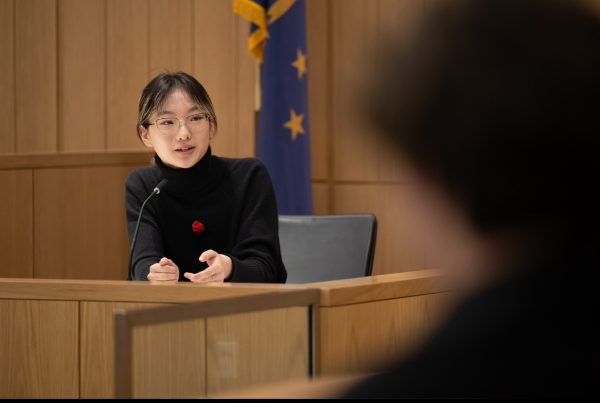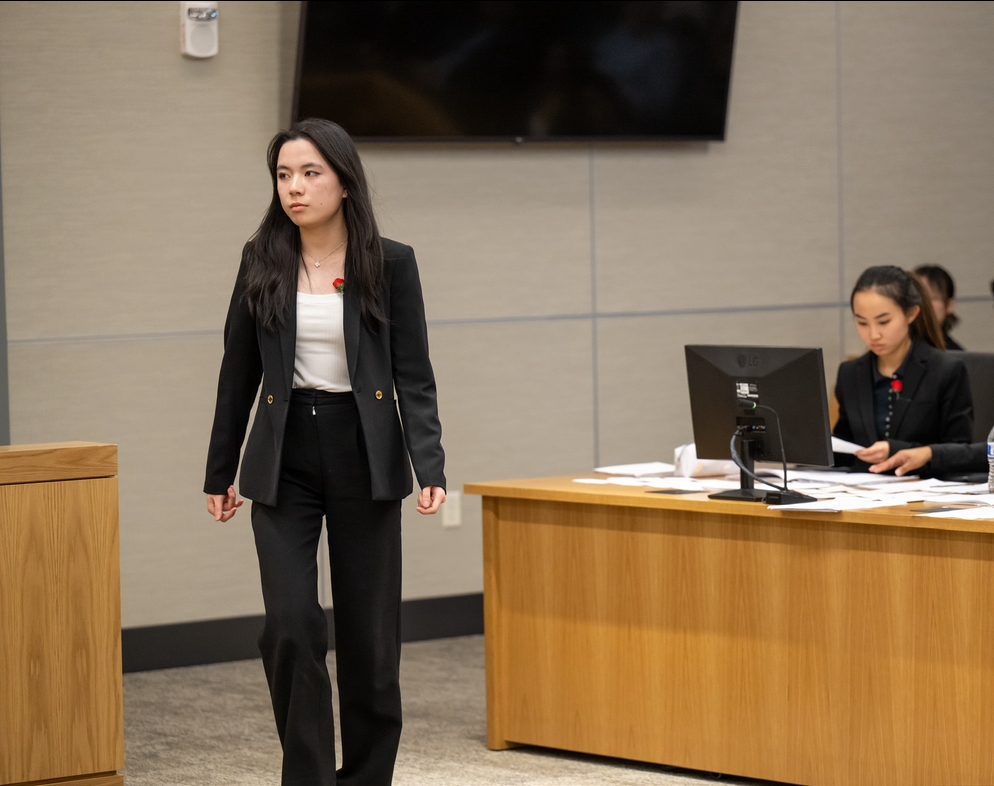For senior Ava Luo, her participation in Mock Trial and Speech and Debate has improved her confidence regarding public speaking and made her a more adaptive speaker overall.
“I used to get extremely nervous before I had to present. My palms would be super sweaty, my stomach would start to hurt and I would feel like all of the air rushed out of my body like I couldn’t breathe. So before freshman year, the thought of even being in debate or mock trial was terrifying to me, but I was determined to push myself out of my comfort zone,” Luo said. “Mock Trial and the (Speech and Debate team) have definitely made me a better public speaker. Both have helped me to develop adaptability, as they both have improvisational aspects.”
In a similar vein, junior Aryan Acharya, a member of the Carmel Speech and Debate team, said his club has empowered him to be a better professional speaker.
“Prior to Speech and Debate, I never really was a confident speaker and lacked the skills to give an efficient presentation. And this club has opened doors for me to not only critically think in new ways, but also present more confidently,” Acharya said. “Judges at local tournaments always give feedback, and this feedback is vital toward growth as a whole, both in the realms of public speaking and debating.”

Luo and Acharya aren’t alone in their initial nervousness surrounding public speaking. According to a 2022 study conducted by the University of Florida, 72 to 75% of Americans suffer from an immense fear of public speaking. For comparison, a 2022 study conducted by Statista, reports 11% of Americans are afraid of death. This means that public speaking arouses more fear in the everyday person than even death. Studies like these highlight the importance of professional speaking experience from a young age, which is why public speaking clubs have become paramount to developing these critical skills.
Important Public Speaking Skills
According to Joseph McMillan, Carmel Speech and Debate team head coach, and world history teacher, public speaking skills are vital in the digital age, which is why public speaking clubs have become more popular.
“Public speaking skills are extremely important. We’ve all met very intelligent people who don’t get their ideas out as effectively because they aren’t strong communicators. If a person learns to speak in a public setting, it helps them communicate with people on all levels, from large crowds down to one-on-one conversations,” McMillan said. “Especially as technology improves and more tasks become automated, the ability to communicate effectively and productively with others has never been more important. The effective speaker analyzes and adjusts to every speaking situation, and all of these (public speaking) activities put students in countless different speaking situations. Each one is a valuable learning experience.”
Luo said she agrees with McMillan and said the biggest public speaking lesson she learned from these clubs is the importance of adaptability.
“I think that I’ve learned a lot from both (Speech and Debate Team) and Mock Trial about public speaking. One (lesson) is to keep in mind is that not everything is going to go as planned. And when something doesn’t go as planned, it’s important to not panic and (to) adapt to the circumstances,” Luo said. “For example, sometimes in Mock Trial, a witness might not give the answer you prepared for. Instead of freaking out about how things didn’t go according to the way you rehearsed, go with the flow and adapt to the situation while still making sure you’re on the right track.”
Acharya said the biggest public speaking lesson he learned was to be willing to take up space and attention during a speech.
“The most valuable lessons I’ve learned are that you have to be the main character in your room and know your audience well enough to deliver a presentation. Allowing yourself to be that ‘main character’ gives way toward giving a strong sense of confidence and often resonates with your audience,” Acharya said. “Knowing your audience is just as important; you need to acknowledge what the room is like and what points of your speech you want people to really take away. At the end of the day, you’re giving a speech of a certain length, but if you’re not emphasizing specific content, then your audience will probably forget what you said by the time you walked out of the room.”
McMillan said the most valuable public speaking lessons he’s seen students gain from public speaking clubs include confidence in oneself, dedication to improve, and the ability to ask for help.
“The biggest lessons are: 1. Your voice matters. Every person has different life experiences that have shaped them into who they are and all of us can learn from others. 2. You can get better if you’re willing to try. It takes practice to get better at anything, and public speaking is no exception. Bet on yourself and watch it pay off with persistence. 3. Support is all around you. These clubs provide much more than opportunity; they provide community, and that’s invaluable,” McMillan said. “A group of other students who are facing many of the same challenges who are there to help one another through struggles and celebrate each other in successes is one of the best aspects of these clubs.”
Improvement in All Forms of Presentations
Luo also said she’s gotten better at school presentations because of her involvement in public speaking clubs.
“Being in Debate and Mock Trial has actually helped my presentation skills so much. I took AP Seminar in my sophomore year and we had to do a lot of presentations in the class, so having those public speaking skills developed was really helpful,” Luo said. “In junior year, I joined DECA and competed in a role-play event, where you’re basically given a scenario and a 10-minute preparation period before you have to present to a judge for around 10 minutes. I was able to make it to ICDC (International Career Development Conference) and if it weren’t for the (Speech and Debate team) and Mock Trial I definitely would have struggled a lot more.”
Acharya said he agrees with Luo and said he believes public speaking clubs have improved his ability to clearly communicate with a diverse range of people.
“(Speech and Debate) has taught me a lot about getting my argument/point out to a specific audience. I’ve learned how to effectively structure presentations, engage my audience, and emphasize on certain points to leave my audience with takeaways,” Acharya said. “(Speech and Debate) has taught me a lot about clarity of communication as that is so important to doing well at competition. Especially with the thought process behind speech and debate as a whole, the club taught me so much about looking at a wide range of perspectives. This skill set allows me to take a new approach toward conveying my ideas to diverse audiences as I can see how others would feel about a certain topic.”
Professional Development

Luo also said the skills she gained from her participation in public speaking clubs will aid her in speaking out against societal issues in the future as well as in professional development.
“I think both clubs are very supportive communities. Both clubs have great people in them that encourage you to express your opinions and feel heard and seen, which is really great,” Luo said. “I hope that I’ll be able to use my skills to help my community because public speaking is such a powerful tool that can help raise awareness of certain issues or problems. Being in Mock Trial and Speech and Debate has encouraged me even more to pursue a career in law and business.”
In honor of Professional Speaking Day on Aug. 7, Acharya said people should definitely dip their toes into more public speaking clubs.
“Public speaking can most definitely be scary at times, but it’s doable. Being a part of Speech and Debate here at Carmel has been a very highly rewarding experience, as it taught me not only to grow as a presenter but as a person myself,” Acharya said. “I strongly recommend people to try out various public speaking clubs to build their presentation skills.”
McMillan said everyone is welcome at public speaking clubs and they can help build community and confidence for all high schoolers.
“If you’re interested in joining a club/team/activity but afraid of the public speaking element, don’t let that hold you back. It will help you overcome that fear along with an awesome, supportive group of people in the same boat who will help you on your journey to becoming a better communicator.

































![AI in films like "The Brutalist" is convenient, but shouldn’t take priority [opinion]](https://hilite.org/wp-content/uploads/2025/02/catherine-cover-1200x471.jpg)









































![Review: “The Immortal Soul Salvage Yard:” A criminally underrated poetry collection [MUSE]](https://hilite.org/wp-content/uploads/2025/03/71cju6TvqmL._AC_UF10001000_QL80_.jpg)
![Review: "Dog Man" is Unapologetically Chaotic [MUSE]](https://hilite.org/wp-content/uploads/2025/03/dogman-1200x700.jpg)
![Review: "Ne Zha 2": The WeChat family reunion I didn’t know I needed [MUSE]](https://hilite.org/wp-content/uploads/2025/03/unnamed-4.png)
![Review in Print: Maripaz Villar brings a delightfully unique style to the world of WEBTOON [MUSE]](https://hilite.org/wp-content/uploads/2023/12/maripazcover-1200x960.jpg)
![Review: “The Sword of Kaigen” is a masterpiece [MUSE]](https://hilite.org/wp-content/uploads/2023/11/Screenshot-2023-11-26-201051.png)
![Review: Gateron Oil Kings, great linear switches, okay price [MUSE]](https://hilite.org/wp-content/uploads/2023/11/Screenshot-2023-11-26-200553.png)
![Review: “A Haunting in Venice” is a significant improvement from other Agatha Christie adaptations [MUSE]](https://hilite.org/wp-content/uploads/2023/11/e7ee2938a6d422669771bce6d8088521.jpg)
![Review: A Thanksgiving story from elementary school, still just as interesting [MUSE]](https://hilite.org/wp-content/uploads/2023/11/Screenshot-2023-11-26-195514-987x1200.png)
![Review: "When I Fly Towards You", cute, uplifting youth drama [MUSE]](https://hilite.org/wp-content/uploads/2023/09/When-I-Fly-Towards-You-Chinese-drama.png)
![Postcards from Muse: Hawaii Travel Diary [MUSE]](https://hilite.org/wp-content/uploads/2023/09/My-project-1-1200x1200.jpg)
![Review: "Ladybug & Cat Noir: The Movie," departure from original show [MUSE]](https://hilite.org/wp-content/uploads/2023/09/Ladybug__Cat_Noir_-_The_Movie_poster.jpg)
![Review in Print: "Hidden Love" is the cute, uplifting drama everyone needs [MUSE]](https://hilite.org/wp-content/uploads/2023/09/hiddenlovecover-e1693597208225-1030x1200.png)
![Review in Print: "Heartstopper" is the heartwarming queer romance we all need [MUSE]](https://hilite.org/wp-content/uploads/2023/08/museheartstoppercover-1200x654.png)




